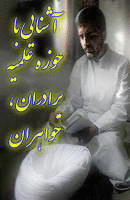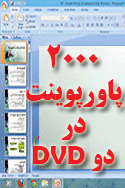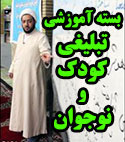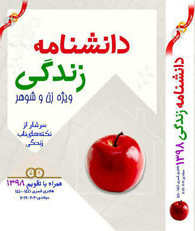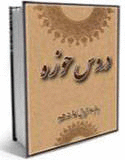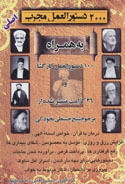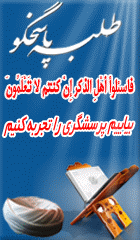کلیپ های دیدنی
مشاوره و خانواده
با توجه به ترک خود ارضایی عوارض آن هنوز در من هست چگونه آن را برطرف کنم ؟
13-08-1399 بازدید:5686 مباحث جنسی و زناشویی همکار پاسخگو

آیا بخاطر وسواس فکری توهین به مقدسات گناه دارد؟
19-05-1398 بازدید:5391 مشکلات و اختلالات روانی همکار پاسخگو
آیا از طریق اینترنت می تواند ازدواج موقت کرد ؟
پرسش: با سلام من 22 سالمه از پارسال با يه دختري در…
از زندگی سیر شدم و آرامش ندارم چکار کنم؟
پرسش : سلام..خواهش ميکنم يه راهي جلو روم بذارين من از…
من از تاریکی شب به دلیل توهمات ذهنیم میترسم چکار کنم؟
پرسش: من وقتي در خانه تنها مي شوم و هوا تاريك…
شب ها كابوس فيلم هاي مبتذل را که قبلا نگاه می کردم میبینم!
پرسش: (در خصوص توبه از ديدن فيلم هاي مبتذل) در اين…
بنده متاهلم و در اینترنت با دختری آشنا شدم که کارمون به گناه کشید!
پرسش: بنده یک مشکلی دارم که می خواستم از شما راهنمایی بخواهم…
جوانی هستم که از زندگی خسته شده و احساس پوچی می کنم!
پرسش: راستش نمی دانم از کجا شروع کنم. 20 ساله هستم…
از طریق اینترنت با پسری آشنا شدم و مدتها با هم در ارتباط بودیم!
پرسش:من دانشجوی ارشد رشته حقوق تقریبا حدود 1 سال پیش…
چرا خانواده ها عاشق شدن را برای جوانان (دختر) بد می دانند؟
پرسش: چرا خانواده ها عاشق شدن را برای جوانان (دختر) بد…
چگونه دیدن فیلم های مبتذل را ترک کنم؟
پرسش: با سلام به حضور حضرت عالي اگرخاطرتان باشد ،من قبلا هم…
با شوهرم قبل از ازدواج رابطه نانشروع داشتم!
پرسش: با سلام من زنی 25 ساله هستم.حدود 1 سال است…
اگر دختری عاشق غیر هم جنس خود...؟
پرسش: اگر دختری عاشق غیر هم جنس خود شود البته نه…
اگر نتوانيم جلو شهوت خود را بگيريم ، چه بايد بكنيم ؟
پرسش: اگر نتوانيم جلو شهوت خود را بگيريم ، چه بايد…
جوانی هستم 21 ساله اهل تهران و تمایل زیادی به سکس دارم
پرسش: من جوانی هستم21 ساله اهل تهران وتمایل زیادی به سکس…
نمي دونم چرا از ازدواج مي ترسم؟!
پرسش: سلام مشکل من اینه که نمي دونم چرا از ازدواج مي…
چرا به زن مطلقه با یک چشم و دید دیگری نگاه می کنند؟!!
پرسش: سلام حاج آقا من یک خانم مطلقه هستم و سوالم اینه…
چرا مخالف رابطه دختر و پسر هستید؟؟!!
پرسش: سلام حاجاقا چند تا سوال داشتم ممنون میشم جواب بدید. 1 چرا…
شب زفاف یا حجله چه شبی است و زن و مرد چکار باید بکنند؟
پرسش: شب زفاف و یا شب حجله که در روایات هم…
چه زمانی برای رابطه جنسی با همسر مناسب است؟
پرسش: چه زمانی برای رابطه جنسی با همسر مناسب است؟ و…
دختری که در سن جوانی و نوجوانی دچار شهوت می شود چه باید بکند؟
پرسش:دختری که درسن جوانی و نوجوانی دچار شهوت می شود…
می خواهم خوب باشم ولی دوست دخترم نمی گذارد!!
پرسش: به دلیل که من مدتی است به شهر آمده ام…
وقتی که عصبانی می شوم دیگر هیچ چیزی دست خودم نیست چکار کنم؟
پرسش: سلام آقای پاسخگو من دارای اخلاق بدی هستم وبا همه خواهر…
من دحتر قبلی نيستم و به يك دختر فاسد تبديل شده ام!
پرسش: من دختري هستم 14ساله من اول دختري سنگين بودم اما…
در مورد وسواسی و راه درمان آن توضیح بفرمایید؟
پرسش: وسواسی چیست و برای درمان آن چه راهکارهایی معرفی می…
خواسگارم بد اخلاق است آیا جواب مثبت بدهم؟
سوال: آیا به پسر بد اخلاق که خواستگاری کرده جواب مثبت…
اخلاقم رُك گفتن است اما حق ميگويم و شوهرم مخالف رفتارم است.
پرسش: اخلاقم رُك گفتن است اما حق ميگويم و شوهرم…
خواستگارم دو ازدواج و یک نامزدی ناموفق داشته جواب مثبت بدم؟
پرسش: خانمی هستم که در گذشته، یک ازدواج_ناموفق داشتم. در حال…
شوهرم گلایه میکنه که چرا همیشه به حرفم گوش میدی!
پرسش: من 20 سالمه 1 ساله ازدواج کردم شوهرم 22 سالشه…
دختر 36 ساله ای که چهره زیبایی ندارد چکار کند؟
پرسش: با سلامدختر 36 ساله اي که مومن و حافظ قرآن…
اختلاف سني پسر با دختر تا چه مقدار ايده آل است؟
پرسش: ميخواستم بدونم ايا ازدواج با دختري که سنش با پسر…
چگونه از انحرافات جنسى به دور باشيم؟
پرسش: در فاصله سنّ بلوغ تا هنگام ازدواج چگونه از انحرافات…
بعضی وقتا اعصابم میریزه بهم با نامزدم بدرفتار میکنم چطورخودمو کنترل کنم؟
پرسش: سلام ببخشید ی سوالی داششتم من دختری۱۸سالم ۷ماهه عقدکردم بعضی…
نقش خانواده در تربيت فرزندان چیست؟
پرسش: نقش خانواده در تربيت فرزندان چیست؟ پاسخ: با سلام و ادب خدمت شما…
نامزدم مي خواهد در كوچه و خيابان آرايش كرده و كمي از موهايم را از روسري بيرون بگذارم!
پرسش: من تا قبل از نامزديم بسيار با حجاب بودم. البته…
چرا برخی مردان در کنار همسرشان آرامش نمی یابند؟
پرسش: قرآن مجيد وجود زن را كانون محبّت و…
علت و شرايط تحقق صيغه چيست؟
پرسش: علت و شرايط تحقق صيغه چيست؟ پاسخ:…
چرا بین دو هوو همیشه اختلاف وجود دارد؟
پرسش: چرا بين دو همسر(زن) با وجود مشروعيّت ازدواج…
پرسش و پاسخ
آیا کسی که شراب بنوشد تا چهل روز نماز و عباداتش قابل قبول نیست ؟
13-08-1399 بازدید:2896 مسائل متفرقه نماز همکار پاسخگو

اذان در جامعه اسلامی نماد چیست ؟ و چرا فقط سه بار در روز تکرار می شود ؟
پرسش: اذان در جامعة اسلامی نماد چیست و…
حکم مشروبات الکلی از دیدگاه اسلام چیست ؟
پرسش: حکم مشروبات الکلی از دیدگاه اسلام چیست…
چرا با این همه ظلم و ستم در جهان امام زمان (عج) ظهور نمی کند ؟
پرسش: چرا با این همه ظلم و ستم…
اگر نگاه به نامحرم گناه است چرا در فیلمهای خارجی زنهای بدون حجاب را نشان میدهند؟
پرسش: چرا میگویند نگاه کردن به نامحرم گناه…

با چه شیوه هایی میتوانیم پیرو انبیاءالهی باشیم ؟
پرسش : چه راه و روشی را پیبگیریم…
چرا زرتشتیان به اعتقاداتشان پایبند هستند ولی مسلمانان نه؟
پرسش : چرا در دین زرتشت گفتار نیک،…
چرا معانی دقیق آیات قرآن مشخص نیست و نیاز به تفسیر دارد ؟
پرسش : به چه دلیل تا تفسیرهای متعدد…
آیا جهت انجام هر کار نامشروعی می توان صیغه جاری کرد ؟
پرسش : اهمیت صیغه کردن در چیست؟ با…
اگر پیامبر (ص) عرب زبان نبود آیا قرآن باز هم به زبان عربی نازل می شد؟
پرسش : اگر حضرت محمد(ص) زبان دیگری به…
آیا در بین پیامبران ،پیامبر خشن هم وجود دارد؟
پرسش : پیامبران به مهربانی معروف میباشند آیا…
با توجه به محاسن روزه آیا معایبی هم در آن هست ؟
پرسش : روزه محاسن بسیاری دارد، آیا این…
جنس خداوند از چه چیزی می باشد و خدا چیست؟
پرسش : جنس خداوند از چه چیزی میباشد…
معنی خدا چیست؟چرا خداوند از حروف دیگر استفاده نکرده است؟
پرسش : تعریف لغوی خدا چیست و چرا…
خال کوبی ابرو (تاتو )از نظر شرعی برای وضو و غسل چه حگمی دارد ؟
پرسش : خالکوبی ابرو (تاتو) از نظر شرعی…
شنیدن صدای زنان در مراسم عزاداری و مولودی چه حکمی دارد ؟
پرسش : شنیدن صدای زنان در مراسم عزاداری…
در چه صورتی امر به معروف و نهی از منکر واجب می شود؟
پرسش : در چه صورتی امر به معروف…
چرا در ایران مردی که از دین خود برگردد حکم اعدام را دارد ؟
پرسش: چرا در ایران مردی که از دین…
آیا ازدواج زن شیعه با مرد سنی اشکال دارد؟
پرسش : آیا ازدواج زن شیعه با مرد…
لمس آیات قرآنی که بر سنگ قبر نوشته شده است بدون وضو چه حکمی دارد ؟
برسش : لمس آیات قرآنی که بر سنگ…
فرق بین احتیاط واجب و احتیاط مستحب چیست؟
پرسش : فرق بین احتیاط واجب و احتیاط…

آیا با زیارت امامان و بوسیدن ضریح آنان انسان دچار شرک می شود؟
پرسش : آیا اعتقاد به این که شیعیان…

چرا در نماز از مهر استفاده میکنیم و فقط پیشانی بر خاک قرار می دهیم؟
پرسش : با توجه به این که هنگام…
آیا علائم هنگام ظهور امام زمان (عج) واقعیت دارد؟
پرسش : آیا وجود نشانههایی هنگام ظهور حضرت…
با وجود مساوات بین زن و مرد چرا مردان در اولویت قرار دارند؟
پرسش : با توجه به این که ما…
طریقه خواندن نماز در زمان رسول خدا (ص) چگونه بوده است؟
پرسش : طریقه نماز خواندن از زمان رسول…
چگونه می توانیم از گناه غیبت پرهیز کنیم؟
پرسش : چگونه میتوانیم از گناه غیبت پرهیز…
چگونه از بدخلقی و صفات زشتم دوری کنم؟
پرسش : چه راهی وجود دارد که انسان…
قطع رابطه با اعضای خانواده که از نظر شخصیتی و اجتماعی مشکل دارند گناه است؟
پرسش : آیا قطع رابطه با افراد خانواده…
آیا روح انسان بعد از مرگ در جسم دیگری دمیده می شود و دوباره به زندگی میکند؟
پرسش : آیا این نظریه درست است که…
اینکه در نماز کاهلی میکنم آیا در دینم خللی ایجاد می شود؟
پرسش : خدا را خیلی دوست دارم،همیشه در…
دلیل علاقه خاص به بعضی از امامان چیست؟
پرسش : چرا برخی برای بعضی امامان ارادات…
در شب اول قبر چه سوالاتی از ما پرسیده می شود ؟
پرسش : شب اوّل قبر چه سئوالاتی از…
آیا دوست داشتن یک نا محرم و ارتباط با او گناه است؟
پرسش : اگر کسی را واقعاً از صمیم قلب…
آیا ادعای ملاقات امام زمان (عج) از جانب برخی افراد صحت دارد ؟
پرسش : بر اساس روایتهای فراوانی امام زمان(عج)…
چرا به اصول و قواعد دین اسلام توجه نمی شود و پذیرش آن از سوی پیروان ادیان دیگر سخت است…
پرسش : دین اسلام کاملترین دینهاست و آسانترین…
آیا نظریه تناسخ از دیدگاه اسلام پذیرفته شده است ؟
پرسش : آیا نظریه تناسخ که بزرگان زیادی…
دست نوشته های طلبه پاسخگو

برای احترام به این ماه هم که شده این کار را انجام بده. مطمئن باش که یاد خدا باعث می شود که هیچوقت به سمت آن اشتباهات نروی.
برای همین یک ماه هم که شده از آن ها صرف نظر کرد و در ضیافت خدا شرکت بنما. بعد از این یک ماه، کیفیت زندگی ات را با گذشته مقایسه کن.
اگر بدتر شده بودی، دوباره به سمت آن گناهان و اشتباهات برو. ولی این ماه چنان عشقی به تو می دهد که دیگر زندگی ات به مانند گذشته نخواهد شد. این ماه خداوند تو را با عشق پذیرایی می کند.
Islam and the Genuine Needs of Every Epoch
Islam and the Genuine Needs of Every Epoch
The significance and value of every scientific idea depend upon its practical value in life. The most primitive and simple idea like the drinking of water, and the eating of food, occupies an important place in human existence; that. is, notwithstanding its simplicity it is as vital as life itself. Another idea that apparently seems to be very simple and trivial is the idea of the necessity of social and collective life; it has the same importance in human history as human civilization itself. It is this idea that co-ordinates, every second, millions of human acts with one another and produces every day billions of desirable and undesirable effects. Evidently, the question whether or not a religion like Islam can cater to all human needs in every age is of such paramount significance that nothing more important can possibly be conceived.
Almost every Muslim individual is acquainted with at least some of the Islamic laws. Like other religious intellectual material that Islam has produced, this conceptual inventory has been stored in the minds of its followers for century after century. If has been transferred from one generation to the next as a religious heritage. However, like other religious relics, this heritage has lain idle in the minds of individuals without being subject to proper use, inquiry and scrutiny.
If we Easterners try to recall the history of the times of our ancestors and forefathers, we shall see that for thousands of years the regimes that ruled us never gave us any freedom of thought, especially in scientific or social matters. A ray of hope that shone for a while during the early era of Islam through the efforts of its Messenger and which brought tidings of a distant dawn was lost in the centuries-long night of oppression by a series of egocentric tyrants.
Again we were left in a state of slavery and bondage. We remained tortured and tormented in the infernal, deadly dungeons, repeating our age-old obsequious utterances: 'Yes! Yes Sir! Yes your highness! Yes your royal majesty! "
Whoever was more clever was only able to guard and preserve the religious material in an intact condition storing it for some luckier generations to come. Moreover, the rulers of those times were not indifferent to encouraging such an attitude for preventing open and free discussion of issues in the society. Their only concern was that people should be so busy with their work that they would not leave their cocoons. With the public submerged safely in their own personal errands, the administration of the community was the concern of the rulers and the self-named guardians of the society.
They were not alarmed at people's interest in the comparatively simple religious material. They only wanted to keep them from free and inquisitive discussions. They considered themselves as the community's active mind.
They had well realized that the most powerful source of strength in social life is the will power of human individuals. and this power was safely harnessed by the rulers by controlling their minds. As a result all their effort was concentrated on the conquest of the public's mind so that they may themselves become the active intellect of the community. These are the facts that anyone who turns to the historical chronicles of the past will uncover without much assiduous study.
Of late, the Western deluge of "freedom", after satiating the Europeans, has now turned towards Eastern lands. Initially it sought admittance to our continent as a guest, then it became an authoritative master in our own house. At first it gave a war cry against dogmatism and intellectual repression. The presence of this partisan of freedom seemed to provide a good opportunity for us to restore our lost dignity and to start a new life of intellectual brilliance and to undertake a belated synthesis of knowledge and action. But sadly, the same European freedom that delivered us from the clutches of the oppressors took their place to become our "active mind".
We did not know what to do. When we came to our senses, we realized that times had silenced the lords of the olden days and dethroned from the seat of authority the commands of the autocratic sovereigns and aristocrats. We were asked to pay no more heed to what the broken idols spoke but instead to listen to and to imitate what the Europeans said and did.
One thousand years have passed since the soil of Iran embraced the last remains of Ibn Sina. His philosophic and medical books were presented in our libraries and his scientific views were on the tips of our tongues, though without any consequence.
Seven hundred years had passed since the mathematical works and the cultural heritage of Khwajah Nasir al-Din al-Tusi were the goal of our lives, though without any result. But following in the footsteps of the Europeans, we joined them in celebrating their one-thousandth and seven-hundredth anniversaries. More than three centuries were past since the philosophical school of Mulla Sadra was followed in Iran and his philosophical ideas were the subject of study. On the other hand, many years had also passed since the Tehran University was established and had opened a faculty of philosophy. But some years back when a conference was held there, one of the Orientalists made some remarks in appreciation of Mulla Sadra, this caused an unprecedented clamor in the university regarding his personality and philosophic thought.
These are a few examples which fully illustrate the state of affairs in our society and the nature of our intellectual temperament. This shows the degree of our intellectual bankruptcy and servility to others.
Such was the condition of the majority of our intellectuals. A few of them, who were successful in retaining their independence of thought and had preserved their intellectual heritage, became the victims of the malady of split-personality. They were infatuated with the ideas of Western thought and at the same time remained loyal to their Eastern intellectual heritage. They strived to bring about a reconciliation between these two opposite poles and to create a state of matrimonial harmony between the unlikely pair.
One of our able writers tried to reconcile the Islamic tradition with the Western tradition of democracy in an article entitled "Islamic Democracy". Another gentleman strove hard to extract the notion of a classless society from Islamic texts, under the title of "Islamic Communism"!
Isn't that strange? One should ask them: if the relevance and validity of Islam should conditionally depend upon its affinity to the "vital principles" of democracy or communism, when the same democracy and communism with their all pomp and pageantry have come to us on their own, what is the necessity of taking such great pains in trying to produce a compromise between them and a handful of out-dated fourteen-centuries-old notions?
If Islam is an independent and living entity by itself, what is the need to compromise its natural grace with borrowed artificial adornments in order to invite customers?
During the post Second-World-War years, Western scholars have been enthusiastically discussing and studying various religions and publishing their findings. Imitating them, we also followed the same course and chose certain aspects of our holy religion as the subject of discussion and-debate: Are all religions true? Are the 'heavenly' religions anything more than a series of attempts in social reform? Do these religions have any other aim except purification of the soul and correction of morals? Can religious rites and rituals exist forever in their respective societies? Do religions have any purpose other than the exercise of rites and rituals? Does Islam fulfil the needs of every epoch? etc.
Indeed, a careful scholar, before entering into any controversy, would first verify the validity of questions raised according to certain established scientific criteria and only afterwards he would express his opinion. But the Western thinkers consider religion to be simply a social phenomenon, a result of a series of physical factors, like society itself.
Those Western thinkers who were rather optimistic regarding religion-including Islam-say that it is the mental contrivance of a group of men of genius, who, under the effect of a purified spirit, a rich intellect and an indomitable will, have conceived certain moral laws for the purposes of reforming their societies. These laws have evolved with the gradual development of human societies.
They say that the empirical data, as well as historical evidence, provide sufficient proof of the fact that human societies gradually move towards perfection, and every day humanity takes a new step in the direction of civilized living. They cite the results of psychological, legal, sociological and even philosophical discussions, particularly the theory of dialectical materialism, to prove that since human societies do not remain in a static condition, in the same way their enforceable laws also cannot remain unalterable.
They argue that the laws that might have guaranteed the welfare of primitive human beings who ate of the fruits of the jungle and who dwelled in caves, can never be sufficient for the purposes of sophisticated life of modern times. How can the laws that were formulated when people used to fight with spears and clubs, suffice for a resourceful and cultured age like ours equipped with the most sophisticated nuclear bombs? Could laws belonging to an age when people used to travel on horseback and on mules be of any use to people accustomed to aircraft and nuclear submarines?
It means that the modern world neither accepts, nor should it be expected to accept, the laws and regulations belonging to the ancient times. Consequently, the laws legislated by societies of the past should be subjected to constant change with respect to the changing conditions of humanity. As a result of change in practical values, moral norms also need to be revised; since morality is no. more than a series of psychological habits that become stable due to repeated performance.
The simple life of two or three thousand years ago did not require the intricate political systems of today. Can the women of modern society lead a life of chastity similar to the veiled ladies of the past? Even the laborers and peasants and other toiling classes of today's world could not be expected to possess the patience and endurance of the toilers of past ages? The agitated revolutionary minds, living in an age of the conquest of space, could not be expected to be terrified by lunar and solar eclipses or black winds and made to resign and submit to the Will of God?
It means that human societies, in every age, desire law and morality to be according to the temper of that age.
By Allamah Muhammad Hussein Tabatabaei
Translated by Mahliqa Qara'i
وبگــــــــــردی طلبۀ پاسخگو
- فایل اعمال و رفتار های خلاف قانون جناب آقای حسن روحانی
- در کنج خانه طلبهها چه میگذرد؟
- سکوت چند ساله مسئولان حوزه در قبال حملات وحشیانه به طلاب!
- می گویند که مملکت مملکت آخوندهاست!!
- یک ماجرای تلخ که خانم ها با تأمل بیشتر بخونند
- جریان های تکفیری موجود در عراق و نحوه شکل گیری آنها
- سیر تکاملی تفکر سلفیه چگونه بوده است؟
- بداء در قرآن و حدیث چگونه مطرح شده است؟
- پیامبر (ص) با مخالفین خود چگونه بر خورد می کرد؟
- سبک زندگی حضرت زهرا سلام الله علیها
- ملاک کرامت و شرافت افراد، انسانیت است یا جنسیت؟
- رنگ و پوشش های رنگی در اسلام
- حجاب، زنان را افسرده میکند و مانع پیشرفت اجتماعی آنهاست!!!
- علوم لدنی معصومین
- مگر ولی فقیه معصوم است که ولایت مطلقه دارد؟
- اگر خدا ازعاقبت ما اطلاع دارد قیامت برای چیست؟
- آیا بجای نماز خوندن، پیانو یا سه تار بزنم؟
- چرا مراسم عزاداري امام حسين(ع) پيش از شهادت ايشان صورت ميگيرد؟
- چرا امام حسين(ع) در كربلا براي رفع تشنگي از خداوند طلب باران نكرد؟
دانــــــلود های مفیـــــــــــــــــــد
- دانلود پاورپوینت شناخت وهابیت و صهیونیسم و ارتباط با همدیگر
- دانلود دو پاورپوینت اجرای عید غدیر خم
- دانلود پاورپوینت احتجاج اميرمؤمنان (ع) به غدير
- پژوهشی در کلام و پیام مقام معظم رهبری پیرامون ماه رمضان
- خطبه شعبانیه و خطبه امیرالمومنین(علیه السلام) پیرامون روزه و ماه رمضان
- دانلود پاورپوینت و pdf تفاوت های زن و مرد
- دانلود جزوه ساعات سعد و نحس(زمان نوشتن دعا)
- تقویم مذهبی شمیم یار 96 مخصوص کامپیوتر
- دانلود نرم افزار «شیعه شناسی»
- دانلود پاورپوینت ساختار خانواده و مسایل آن
- دانلود کتاب دایره المعارف جنسی
- دانلود نکات جذاب دوران عقد
- دانلود کتاب درمان سرد مزاجی و بی میلی جنسی بانوان
- دانلود کتاب حسادت کودکان
- دانلود کتاب درمان خستگی وناتوانی جنسی
- دانلود پاور پوینت اسیب های ازدواج وخانواده
- دانلود پاورپوینت هشت گام برای تحقق رویا به واقعیت
- دانلود پاورپوینت تقویت اراده
- دانلود پاورپوینت موفقیت وروشهای رسیدن به ان
- دانلود پاورپوینت هنر رفتار با افراد دشوار
- دانلود پاورپوینت جملات جالب وجذاب روحیه بخش بزرگان
- دانلود پاورپوینت راههای مقابله ودرمان استرس
- دانلود پاورپوینت نیازهای اساسی کودکان
منبــــرهای مکــــــــــــــــــتوب
- منبر مکتوب: روز عرفه و فرصت ها
- منبر مکتوب: سبک زندگی امام باقر علیه السلام
- منبر مکتوب: سه نیاز مومن (امام جواد علیه السلام)
- سخنرانی سلسله ای و چند جلسه ای مناسبت ماه رمضان
- دانلود 30 جلسه سخنرانی ماه مبارک با موضوع تنها مسیر
- موضوعات پیشنهادی سخنرانی برای محرم
- فضائل حضرت قمر بنی هاشم علیه السلام
- برکات وجود ابا عبدالله علیه السلام بر عالم
- بررسی بُعد اخلاقی،عبادی و عرفانی عاشورا
- آخرين وصيت امام حسين عليه السلام
- اولین علت رویاروی در کربلا؛ دوری از یاد خدا
- هميشه حزن؟ شادي چرا نه؟ - شب دهم محرم
- چرا نفرين ؟ - شب نهم محرم
- نماز ظهر عاشورا - شب هشتم محرم
- فلسفه عزاداری - شب هفتم محرم
- دفاع از دین - شب ششم محرم
- فلسفه حضور خانواده سيد الشهداء - شب پنجم محرم
- علم امام علیه السلام به شهادت - شب چهارم محرم
- فقدان شرایط امر به معروف و نهی از منکر- شب سوم محرم
مناظرات طلبه پاسخگو
بیشترین دانلود ها
- دانلود صوتي تکنیک های نزدیکی زن و شوهر (108233)
- دانلود رایگان کتاب خواص سوره های قرآن (55172)
- دانلود پاورپوینت بسیار مفید مهارت های زندگی (37744)
- دانلود پاورپوینت و pdf تفاوت های زن و مرد (34393)
- دانلود كتاب مسائل جنسي و زناشوئي در احاديث (34000)
- دانلود کتاب دایره المعارف جنسی (32450)
- دانلود پاورپوینت های آموزش پیش از ازدواج (30821)
- دانلود بسیار مفید پاورپوینت آئین همسرداری (30250)
- دانلود 110جلد کتاب بحارالانوار علامه مجلسی ره (29904)
- دانلود پاورپوینت آموزشی بررسی رابطه دختر و پسر (29881)
- دانلود كتاب دختران خوب به آسمان می روند دختران بد به همه جا (28791)
- دانلود کتاب درمان سرد مزاجی و بی میلی جنسی بانوان (28596)
- دانلود کتاب آموزش جنسی آقایان (28551)
- دانلود كتاب فرق و مذاهب كلامي استاد رباني گلپايگاني (28487)
- دانلود نکات جذاب دوران عقد (28139)
- دانلود نرم افزار «شیعه شناسی» (26508)
- دانلود کتاب درمان خستگی وناتوانی جنسی (25685)
- دانلود پاورپوینت تقویت اراده (24144)
جدیدترین مطالب سایت
- پاسخ به شبهات ولایت (4796) بازدید
- پاسخ به شبهات ولایت (4595) بازدید
- اذان در جامعه اسلامی نماد چیست ؟ و چرا فقط سه بار در روز تکرار می شود ؟ (3960) بازدید
- باتوجه به عادل بودن خداوند چرا بعضی از انسانها را ناقص الخلقه آفریده است ؟ (4040) بازدید
- ویژگی خاص قرآن چیست که کسی نمی تواند مانند آن را بیاورد ؟ (4326) بازدید
- با توجه به ترک خود ارضایی عوارض آن هنوز در من هست چگونه آن را برطرف کنم ؟ (5686) بازدید
- آیا بدن اخروی مانند بدن مادی است ؟چهره ی واقعی انسان در قیامت چگونه است ؟ (5142) بازدید
- آیا ادعای ملاقات امام زمان (عج) از جانب برخی افراد صحت دارد ؟ (4627) بازدید
- چرا به اصول و قواعد دین اسلام توجه نمی شود و پذیرش آن از سوی پیروان ادیان دیگر سخت است ؟ (5016) بازدید
- فلسفه وجود لباس روحانیت در عصر حاضر چیست ؟ (3612) بازدید
- آیا وظیفه یک روحانی تنها راهنمایی مردم و فعالیت و تدریس در حوزه هاست ؟ (2999) بازدید
- آیا نظریه تناسخ از دیدگاه اسلام پذیرفته شده است ؟ (5377) بازدید
- آیا توصیف بهشت و جهنم در قرآن تمثیل هایی برای درک بهتر آن جهان است ؟ (4970) بازدید
- با توجه به اینکه اسلام کاملترین دین هست چرا ما نسبت به کشور های غیر مسلمان عقب مانده تر هستیم ؟ (6895) بازدید
- نقش امام و رهبر در جامعه اسلامی چیست ؟ و اگر نباشد چه اتفاقی می افتد ؟ (4648) بازدید
پربازدیدترین های سایت
- زنی هستم که میخواهم به شوهرم خیانت کنم!!! (605564)
- آيا زن شوهر دار بخاطر رفع نیاز جنسی اش ميتواند صیغه شود؟ (501187)
- دوست دخترم حامله شده چکار کنم؟ (398731)
- میل جنسی زیادی دارم و به شدت داره منو عذاب می ده (340771)
- دیدن فیلم های مبتذل زن و شوهر برای تحریک شدن جنسی (217948)
- چگونه همسرمان را آماده آميزش جنسي كنم؟+18 (213255)
- حکم شرعی نزدیکی از پشت! (208265)
- خانم هایی که می خواهند طلبه شوند بخوانند!!! (205770)
- زنم رابطه جنسی برقرار نمیکند!!! (199767)
- از تجربه های تلخ و تکان دهنده دختران بخوانید شاید... (172491)
- گناه با محارم خود داشتم! (146495)
- رابطه جنسی دهانی حكم چيست؟ (131094)
- محرمات و مکروهات و مستحبات حائض+حکم ورد به امکان مقدسه (129605)
- به رابطه خانمم با خواهر زاده اش مشکوکم؟ (123518)
- سفارش اسلام در مورد آمیزش صحیح چیست؟ (99152)
- نام كتاب حضرت نوح و حضرت ابراهیم؟ (97201)
- با زنان چشم سبز ازدواج نکنیم؟ (94982)















































